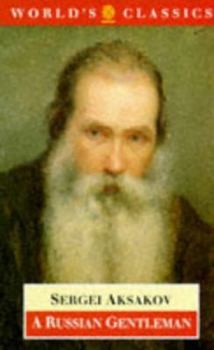A Russian Gentleman
Select Format
Select Condition 
Book Overview
At the center of this chronicle of Russian provincial life in the reign of Catherine the Great stands the patriarchal figure of the author's grandfather, Stepan Mikhailovich. A man of great natural dignity, imbued with respect for tradition and love of the land, he is also despotic and virtually illiterate. Into the family comes his son's new wife, a spirited, intelligent girl from the town. Her eyes see a different world--one tainted by grossness, cruelty, and squalor--and she suffers from the hostility of jealous sisters-in-law and the shortcomings of a husband whom she loves but cannot respect. Her relationship with Stepan Mikhailovich is the heart of a story in which Aksakov celebrates the old feudal way of life without concealing its darker, repressive side.
Format:Paperback
Language:English
ISBN:0192815733
ISBN13:9780192815736
Release Date:August 1982
Publisher:Oxford University Press, USA
Length:226 Pages
Weight:0.31 lbs.
Dimensions:0.4" x 4.6" x 7.3"
Customer Reviews
4 ratings
A Russian Gentleman
Published by Thriftbooks.com User , 15 years ago
"A Russian Gentleman" is a great novel. The author tells his family stories with such vigor that it makes you want to keep reading. Plus it is a good way to learn about Russian culture. Russian culture is demonstrated throughout the story.
Accessible, entertaining Russian classic
Published by Thriftbooks.com User , 23 years ago
Those who think the "Russian classics" are huge books should take a look at this very enjoyable book, a combination of fiction and memoir. The shift from the "heroic" age of the Russian patriarch to the domestic and more feminine world of his successors is interesting. Dostoevsky is urban; try this as one of the depictions of the Russian countryside. A keeper.
Remembrance of things past
Published by Thriftbooks.com User , 23 years ago
Aksakov's book belongs in the rich tradition of memoirs. It is the kind of book in which the author tries to "recover" those days of learning and growing up, which made us be what we are. Sincerity and honesty are crucial to accomplish the task, and in this book, Aksakov gets the upper hand. The style is dry, but not boring; the images are beautiful, both in moments of joy and of sorrow. Inevitably, Aksakov's voice is nostalgic: he longs to be there once again, trodding the streets and rural roads he used to walk with people long gone. His style is practical and direct, and there is not an excess of ornamentation or digressions. Besides, it is an interesting glimpse into life in Russia during the Nineteenth century, full of memorable moments and images.
An intimate look at old Russian provincial family life
Published by Thriftbooks.com User , 24 years ago
In "A Russian Gentleman" (also known as "A Family Chronicle," which is both a more accurate description of the work and a more accurate translation of the original title), Sergei Aksakov narrates a few episodes in his family's history from the time that his paternal grandfather Stepan decided to move to the Russian Empire's spacious southeastern provinces until the time of the 1791 birth of Sergei himself. The chronicle is divided into five "sketches": the first discusses the move east and calls upon a few anecdotes to introduce the very fiery-tempered but (we are assured) good-hearted character of Stepan; the second recounts the marriage of Stepan's beloved ward Parasha at the age of 15 to a brutal scoundrel and recalls Stepan's heroic rescue of Parasha from near death at her husband's hands; and the last three discuss the meeting, wedding, and early married years of Sergei's parents, especially emphasizing the difficulties both had in gaining acceptance by their respective in-laws. Aksakov refers to himself not as a novelist but as a "chronicler of oral tradition," and the book very strongly retains that feel throughout, bringing us more intimately into the concerns and struggles within the family than an author who only had recourse to his or her imagination realistically could. While most of the characters are fairly well-drawn, the two most memorable ones are Stepan and Aksakov's mother (named Marya in real life and Sofya in the book), the latter of whom shows a great deal of both familial devotion and intelligence without ever seeming to be unrealistically glorified. The portrayal of Stepan (the "Russian Gentleman" whom translator J.D. Duff chose to recast as the title character) seems a little more suspect, which is unsurprising since Stepan died when Sergei was five years old, so that Sergei had to rely almost exclusively on questionably-accurate oral accounts of Stepan's doings many years after the fact in order to get a sense of his character. Throughout the work, pretty much all of Stepan's attributes are carried to at-times implausible extremes. Early on, Aksakov portrays Stepan during his angry spells as nothing less than a madman who obliges his whole family to hide from him for days on end, but at the same time as a brilliant judge of character (which Sergei seems to extrapolate merely from the fact that Stepan was the only member of the household to disapprove of Parasha's husband and to approve of Sofya). In the last sketch, Stepan doesn't even care whether his granddaughters live or die but dreams constantly of a grandson; while Stepan was surely eager to have his "noble and ancient name" carried on, one gets the sense that the picture painted in the book is more a reflection of the vanity of the author (who was Stepan's first grandson) than of Stepan's actual feelings (at least, one hopes so). All the same, part of the charm of oral tradition lies in the exaggeration that comes along with it, and the particular items wh






